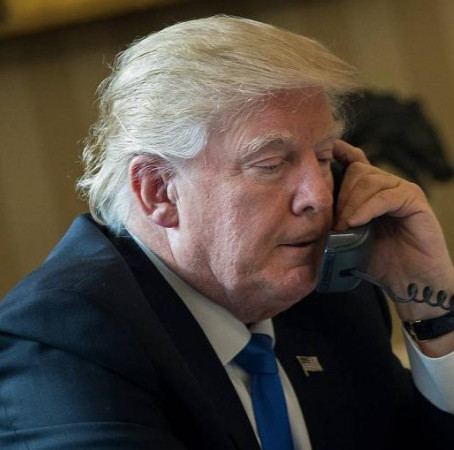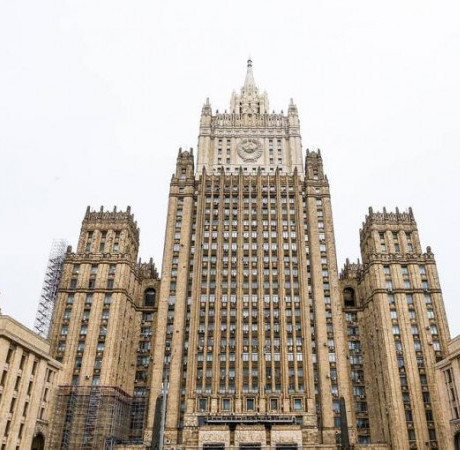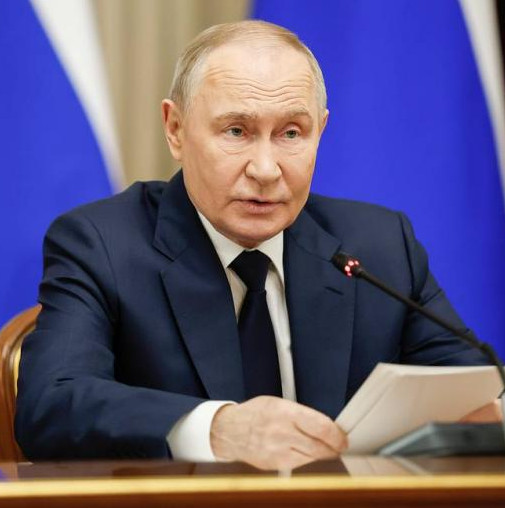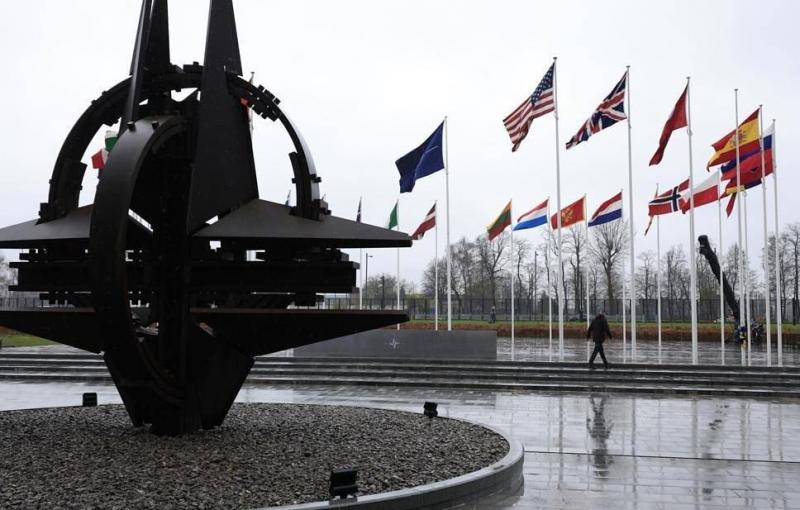Obstacles to peace talks between Russia and Ukraine, NATO's escalating defense budget, and the sharp decline in Russia-Germany trade turnover. These stories topped the headlines in Friday’s newspapers across Russia, TASS news agency.
Vedomosti: What hinders Russia-Ukraine negotiations
Legal guarantees for agreements reached are the cornerstone of a potential peace settlement between Russia and Ukraine, according to a report by experts from the Russian Political Analysis Center (CPKR) outlining the key parameters for resolving the conflict.
The authors of the report note that, in addition to the declared conditions for negotiations between Moscow and Kiev "frequently being mutually exclusive," the overall situation continues to evolve. The pace of Russian units advancing on the frontlines is increasing, while uncertainty has arisen due to decisions by US President Donald Trump’s team. Trump assuming office shifted the discussion of a settlement into a "focused bargaining stage." Russia believes it is necessary to negotiate a resolution to the conflict with the US and is now receiving corresponding signals, adjusting its positions.
The structure of a peace agreement will depend on the situation on the ground, and here Russia holds a stronger stance, said Alexey Chesnakov, head of the CPKR’s research board. "It is no coincidence that Ukrainian officials are openly talking about the necessity of postponing negotiations because Kiev is vulnerable." In his opinion, the recent dates for the conflict’s resolution, which have been circulating since Trump’s inauguration, must be viewed as speculative narratives and instruments of an information war.
The situation is too complex at this time to discuss potential negotiations because the sides’ positions remain deeply divided, said Ivan Timofeyev, director general of the Russian International Affairs Council (RIAC). "There is a coalition of participants led by the US in the West. Moscow believes that a direct conversation with Washington will play the pivotal role in potential talks. Trump has stated that ending the conflict is desirable, and Moscow has also expressed its readiness. Yet the issue remains: how it will happen, because reaching a compromise is extremely challenging."
According to the expert, the main difficulty is not just reaching an agreement but ensuring its implementation. "The Minsk Accords already existed but were essentially sabotaged by the West. The question is: yes, an agreement may be reached, but what happens if it is violated?" For example, if a deal is made to limit arms in Ukraine but is then broken, who will ensure Ukraine complies?" Timofeyev said. "That is, negotiating an agreement is already difficult, but implementing and guaranteeing it will be even harder," the expert concluded.
Nezavisimaya Gazeta: NATO nations to boost defense spending to 3% of GDP
The situation around Ukraine continues to escalate tensions, not only between Russia and NATO but also between the Western military alliance and the Collective Security Treaty Organization (CSTO). In September 2025, Moscow and Minsk will stage the West-2025 strategic military exercises. Meanwhile, NATO will redeploy its troops closer to the CSTO's border, Chief of the CSTO Joint Staff Andrey Serdyukov said.
Earlier, US President Donald Trump declared that he will push for his partners in the military bloc to spend at least 5% of GDP on defense. Currently, they allocate an average of 2% of GDP for this purpose. NATO Secretary General Mark Rutte has repeatedly stressed that NATO countries must spend significantly more on defense than 2% of GDP. And, as the Financial Times recently reported, citing sources, European NATO members have discussed that at the next alliance summit in The Hague, scheduled for June 24-26, 2025, the countries may settle on spending up to 3% of GDP, but no more. Many NATO countries believe that the process of increasing defense spending must progress gradually.
"In total, Europe's NATO defense expenditures exceed those of Russia and all CSTO countries combined. However, this comparison is somewhat misleading. Given efficiency measures, specialization, and the role of Strategic Nuclear Forces, Moscow maintains parity with the US and NATO, its adversaries," Colonel (Ret.) Vladimir Popov, a military expert, told Nezavisimaya Gazeta. He noted that in response to NATO maneuvers near the borders of Russia and Belarus, Moscow has expanded its troop presence and reinforced its forces in the Western strategic direction. "That said, objectives continue to be pursued within the framework of the special military operation, where the Russian army holds the strategic initiative," the expert emphasized.
Izvestia: Russia-Germany trade turnover plunges 82% over three years
The volume of trade between Russia and Germany has collapsed by 82% since 2021 and by 30% since 2023, Izvestia has learned. It totaled $8.6 billion from January to October last year, the German Embassy in Moscow reported, even though at the start of the year, Germany was still Russia’s main trade partner in the EU. Nevertheless, Berlin remains committed to its sanctions policy against Russia, German diplomats affirmed. That said, dissatisfaction with the government’s economic strategy in Germany is growing, with thousands of entrepreneurs protesting in the streets. The country’s GDP has declined for two consecutive years.
Certainly, the severing of economic ties between Moscow and Berlin has taken a toll on Germany’s economy, but the peak impact was in 2022-2023, when the cutoff of Russian energy shipments drove energy prices higher within Germany and triggered significant inflation, said Sergey Shein, senior researcher at the Center for Comprehensive European and International Studies at the Higher School of Economics.
Negative trends in Germany are also weighing on the European Union as a whole. Economic stagnation in the country weakens the EU and threatens its internal cohesion in the future, Shein noted.
According to him, there should be no illusions that cooperation between Russia and Germany will ever return to pre-sanctions levels. The situation will only become clearer once potential talks on settling the Ukrainian conflict begin. "It is very hard to turn back under such conditions - restoring ties requires strong political will, which is something the EU currently lacks," the expert concluded.
Izvestia: Syrian Kurds left in the dark on new US plans
Kurdish authorities have not been notified about a shift in US policy and continue working with Washington under the previous framework, co-chair of the Foreign Relations Department in the Autonomous Administration of North and East Syria, Ilham Ahmed, told Izvestia. Earlier, media reported that White House officials had informed their Israeli counterparts that US President Donald Trump intends to withdraw American troops from Syria. Ahmed noted that pro-Turkish forces have been launching attacks on Syria’s northeastern regions while Ankara continues to obstruct Kurdish dialogue with Damascus.
Ankara regards Kurdish militias as a threat to its national security, alleging they are linked to the Kurdistan Workers' Party, which is banned in Turkey. Ankara fears that if US troops withdraw, Kurdish units, previously overseen by the US, will be left unchecked, leading to a security vacuum in Syria’s northeast and northwest, said Vladimir Akhmedov, a senior research fellow at the Center for the Study of Common Problems of the Contemporary East at the Institute of Oriental Studies of the Russian Academy of Sciences.
On January 28, a Russian interagency delegation visited Syria for the first time since the change in leadership. "The visit was constructive. Immediately after the Russian diplomat’s trip, the Hayat Tahrir al-Sham group (outlawed in Russia) was disbanded, while al-Sharaa assumed the presidency, taking on a civilian role. This gives hope that dialogue with him is possible. Cooperation with Bashar Assad faced serious hurdles last year; in many ways, it was at a standstill. In particular, Assad ignored all our proposals to strengthen ties with Turkey. The situation could change under the new government," Akhmedov said.
Nezavisimaya Gazeta: Russia expands footprint in Kazakhstan
Russian Prime Minister Mikhail Mishustin, during a meeting with his Kazakh counterpart Oljas Bektenov, discussed key areas of the two countries’ strategic partnership, placing particular emphasis on cooperation in energy, transport, logistics, and investments. Amid Kazakh President Kassym-Jomart Tokayev’s recent statement about establishing a "nuclear cluster," considerable attention was given to Russia’s potential involvement in the construction of a nuclear power plant in the republic.
Stanislav Pritchin of the Russian Academy of Sciences’ Primakov Institute of World Economy and International Relations (IMEMO RAS) told the newspaper that it is difficult to isolate a single area of discussion because Russian-Kazakh cooperation is broad-based and encompasses virtually all aspects of economic engagement. "At the heart of our partnership are energy, transport, investment, and logistics - critical sectors that shape both the depth of future cooperation and trade volumes. We continue to see steady progress in ongoing projects and the exploration of new initiatives, such as the transit of Russian gas to China via Kazakhstan. The construction of a nuclear power plant in Kazakhstan remains under discussion," the expert observed. In his view, aligning long-term planning and understanding Kazakhstan’s stance on key issues is crucial.
That said, the expert pointed out that Moscow is unconcerned about Kazakhstan strengthening ties with the West. "Our purchases of Kazakh raw materials and exports do not isolate Kazakhstan from the global market or from engaging with Western nations. Our priority is to reinforce the Russian dimension of cooperation," Pritchin emphasized.
TASS is not responsible for the material quoted in these press reviews



